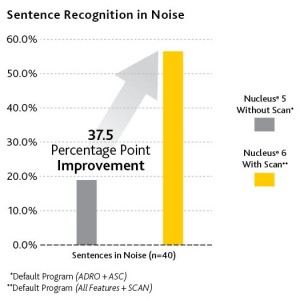You are constantly moving into different listening environments, and you want your sound processor to adapt to all of them – effortlessly. SmartSound® iQ is Cochlear’s most advanced and automated sound processing system and allows your sound processor to adapt to your world automatically. This technology helps you hear your best in any listening environment without the need for manual adjustments to the sound processor, making hearing easier – especially in noisy situations.
Multiple Studies Show Significant Hearing Performance Improvement with SmartSound® iQ
In a recent study1, patients improved their sentence recognition in noise by 37.5 percentage points when compared to the previous technology. What makes these results even more remarkable is that, for the first time, the Nucleus® 6 Sound Processor delivered this improvement automatically – without requiring the participant to change programs based on where they were.

How Does SmartSound iQ Work?
The Nucleus 6 Sound Processor has the world’s first Scene Classifier in the cochlear implant industry that automatically scans your surroundings and identifies the listening environment as one of six scenes: Speech in Noise, Speech, Noise, Wind, Quiet or Music. SmartSound iQ then adjusts the setting for each scene in order to provide you optimal hearing for that situation.
Sound Processing Technology Development Leader, Michael Goorevich, discusses the innovative SCAN program:
https://www.youtube.com/watch?v=WQ9dvQhLDjQ
FDA Approved For Use with Children*
SmartSound iQ from Cochlear is the first major breakthrough in input processing to receive FDA approval for use in children in more than ten years.
It is recommended that the technology be made available to any recipient ages 6 years and older, who is able to:
- Complete objective speech perception testing in quiet and in noise in order to determine and document performance
- Report a preference for different program settings.
Learn more about SmartSound iQ here and how you can benefit from the newest technology.
1 Investigation of Nucleus 6 Sound Processing Input Processing in Cochlear Implant Recipients, IDE G130246 Clinical Investigation Report. September 30, 2014.